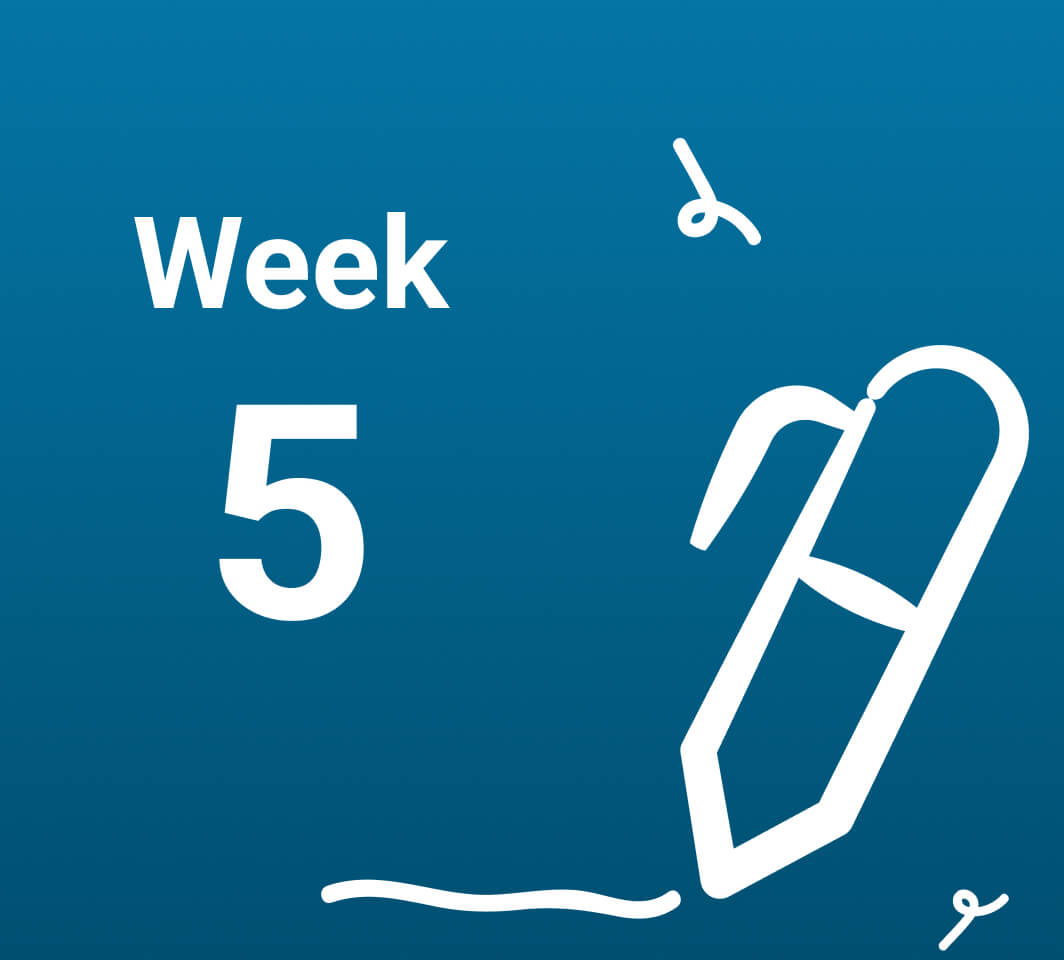Your Nutrition – Pregnancy Week 5
In pregnancy week 5, you should not add extra calories to your diet, but rather, focus on eating nutrient-rich foods. Vitamins, minerals and protein support rapid cell division and organ development in the foetus. During your first trimester, continue to follow a balanced diet.
Multi-vitamins and Minerals
If you are worried that you may not be able to meet your nutrient goals every day, take a multi-vitamin and mineral supplement in addition to eating a well-balanced diet.
Studies have shown a strong link between taking multi-vitamins and minerals before and throughout the first trimester of pregnancy, and healthy pregnancy outcomes. The research showed a reduction in congenital abnormalities such as Neural Tube Defects (NTDs), heart defects, limb deformities and cleft palate.¹
Your Wellness Tips This Week
Make the most out of your doctor visits
Regular prenatal care remains a critical part of monitoring your health, and your baby’s health throughout your pregnancy. Now is the time to schedule your first prenatal visit. Most doctors will schedule the appointment between your 6th and 10th week of pregnancy.
First Prenatal Doctor Visit
During the first prenatal visit, your doctor confirms your pregnancy and records your medical history. Your doctor will probably conduct a physical exam and a series of routine tests to make sure you and your baby are healthy.
Ask questions
It is important to have good communication with your doctor. If you don’t understand something at any doctor visit, be sure to ask for clarification or additional details.
Stay Informed
The more informed you are, the better able you’ll be to make the best nutritional choices throughout your pregnancy.
Look Beyond The Belly
Remember to keep up with other areas of your overall health. Schedule routine dental visits and promptly address other health concerns as they arise.
Find the right exercise routine for you
Exercise supports good health for you and for your baby. Plus, healthy habits today lay the groundwork for your future labour and delivery.
You might find that some types of exercise relieve pregnancy-related aches and pains. Try stretching, walking, swimming, water aerobics, cycling on a stationary bike, low-impact aerobics, or low-impact cardiovascular machines. Experiment to find the routine that works best for you.
Check out a few simple pointers that might help you find the right routine:
- Talk with your doctor about changes in your exercise programme or health routine.
- Equip yourself with the right shoes and a sports bra with plenty of support.
- Don’t skip the stretch! Begin and end with stretching to prevent muscle strain.
- Rise slowly if lying or sitting to keep from feeling dizzy or faint.
- Try for 30 minutes of physical activity or exercise most days of the week.
Your Baby's Development at Week 5
After weeks of rapid cell development, your baby takes on a more distinct form. At week 5, here’s what’s happening inside:
- Heart and circulatory system take shape — a bulge indicates where your baby’s heart is developing. By the end of the 5th week of your pregnancy, your baby’s earliest blood vessels form.
- Around the 5th week of your pregnancy, your baby’s heart begins to beat and might be visible on an ultrasound.
- The umbilical cord replaces the yolk sac. The umbilical cord works with the placenta to bring nutrition and oxygen to your baby and remove waste.
- When you’re 5 weeks pregnant, your baby is the length of the tip of a pen, about 1/7 of a centimetre, and growing rapidly every day.
Your Changing Body at Week 5
The first weeks of pregnancy include the most dramatic internal changes for your body. Your pregnant body change to help your new baby develop. During your 5th week of pregnancy, you might start to notice the following:
Feeling Fatigue?
Your body produces more blood to carry oxygen and nutrients to your baby. The increase in blood might be especially high at 5 weeks pregnant, placing demands on your circulation. Your heart rate increases to keep pace, and these changes might cause fatigue, dizziness, or even headaches.
Other Symptoms of Early Pregnancy
At 5 weeks pregnant, most women start to experience symptoms. These include: breast changes, nausea, heightened sense of smell, frequent urination, or mood swings. But remember, every pregnancy is unique. Some symptoms might come later or not at all.
Light Spotting
Around Week 5, the placenta that will help nourish your baby, grows and combines to the uterus, which might cause light spotting.
Nausea
By 5 weeks pregnant, you might find that certain odours in your daily routine can cause nausea. You might want to identify the source and avoid smells that bother you.
Mood Swings
If you experience dramatic mood swings in your early pregnancy, you’re not alone. You might want to share your feelings and get the emotional support you need from your partner, family, and friends.
References:
¹ Preparing for Pregnancy, Abbott Family. Available at https://abbottfamily.com.sg/articles/prepare/pregnancy
* Comparison among all maternal milk in Singapore as of January 2022, as declared on the label.
SG.2022.23684.SMM.1 (v1.0)


